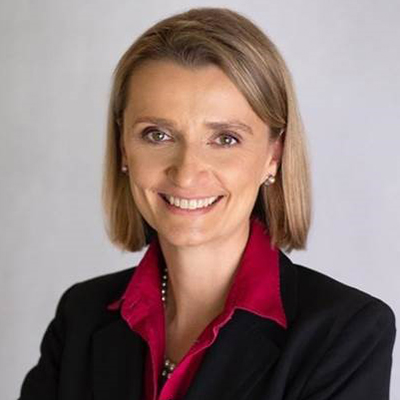 Izabela Szlufarska is the Harvey D. Spangler Professor of Engineering and Chair of the Department of Materials Science and Engineering at the University of Wisconsin – Madison. She received her Ph.D. in Physics from the University of Tennessee – Knoxville in 2002. After a postdoctoral appointment at the University of Southern California, she joined the faculty at UW-Madison in 2004, where she has worked since.
Izabela Szlufarska is the Harvey D. Spangler Professor of Engineering and Chair of the Department of Materials Science and Engineering at the University of Wisconsin – Madison. She received her Ph.D. in Physics from the University of Tennessee – Knoxville in 2002. After a postdoctoral appointment at the University of Southern California, she joined the faculty at UW-Madison in 2004, where she has worked since.
Szlufarska has served in multiple leadership positions, developing and implementing strategies for advancing and promoting the field of materials science and engineering and increasing engagement with diverse stakeholders. As Department Chair, Szlufarska established the first departmental External Advisory Board, significantly increased alumni engagement, and developed new fundraising strategies, leading to a quintupling of the annual fund and securing the first 10 major gifts to the department in many years. In 2021, Szlufarska was elected to the executive committee of the University Materials Council (UMC), a council of materials science and engineering chairs and heads in North America. She was elected by her peers to chair UMC for 2024/2025. As Editor-in-Chief of the Journal of Current Opinion in Solid State and Materials Science, Szlufarska has promoted new ideas and the latest advancements in materials science. She has served on multiple advisory boards and committees, including leading a panel for the DOE BES workshop on Basic Research Needs in Materials for Nuclear Energy.
Szlufarska has been dedicated to service to professional materials societies, including MRS. In the Spring of 2016, she was one of the meeting chairs, providing vision and guidance for the scientific content of the meeting. She represented MRS during Congressional Visit Days in 2017, organized multiple symposia, and has served on MRS Postdoctoral Award Committee and Materials Theory Award committee.
In her research, Szlufarska focuses on the fundamental understanding and design of materials for extreme environments, including the effects of mechanical stresses, corrosion, radiation, and high temperatures. Her research is driven by applications in nuclear energy, high-energy particle accelerators, and tribology. Szlufarska’s primary expertise is in the development and application of theory and atomistic simulations, complemented by nanoscale and microscale experimental characterization. She has led multiple research teams, including Interdisciplinary Research Groups within the UW Materials Research Science and Engineering Center through renewals of the center in 2011 and 2023.
Szlufarska’s contributions to materials science have been recognized with numerous awards, including the TMS Brimacombe Medalist and TMS Light Metals Subject Award – Aluminum Alloys, Outstanding Alumni Award from Wroclaw University of Technology, Poland, the Vilas Associate Award, and the H.I. Romnes Faculty Fellowship from the UW – Madison, as well as NSF CAREER and AFOSR Young Investigator Awards. Szlufarska was also placed on the National Academy of Engineering’s list of Frontiers in Engineering.